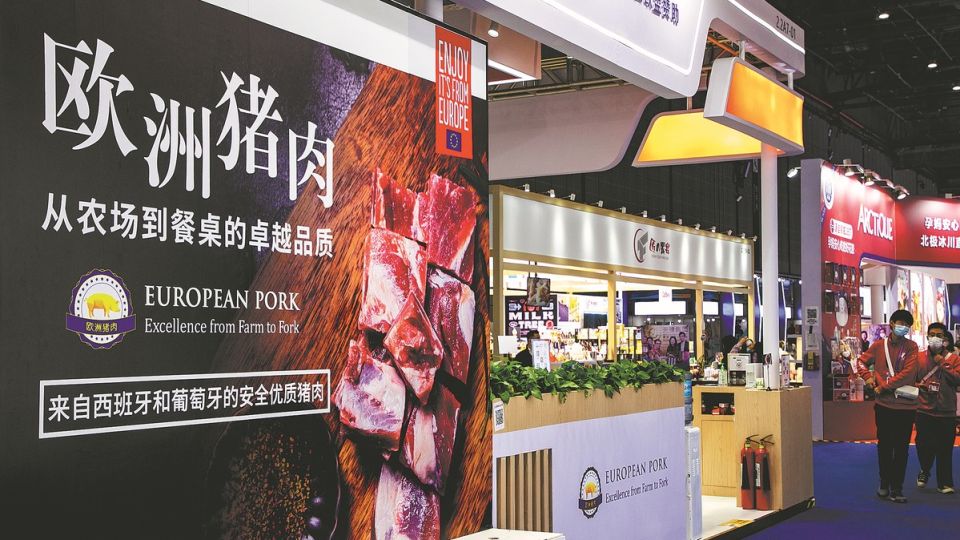June 20, 2024
BEIJING – China’s decision to investigate pork imports from the European Union is the latest step in an escalating trade standoff between the bloc and its largest trading partner, and any antidumping duties would deal a hard blow to the EU’s pork sector, analysts said.
China’s position as the largest consumer of pork globally has fueled substantial imports from the EU. Data from the General Administration of Customs showed China imported some 1.34 million metric tons of pork and pork by-products from the EU last year.
The EU has emerged as a major source of imports of pork and related by-products for China, and more than half of China’s imports in this category were sourced from the EU between 2020 and 2023.
Beijing’s move comes in the wake of the bloc’s decision last week to slap additional import tariffs of up to 38 percent on Chinese-made electric cars from next month after a so-called anti-subsidy probe.
Brussels pointed to “unfair subsidization” in China, which it said “is causing a threat of economic injury” to EU electric vehicle makers, proposing additional tariffs on different Chinese manufacturers — 17.4 percent on market major BYD, 20 percent on Geely and 38.1 percent on SAIC, on top of the standard 10 percent car duty.
The consequences of the protectionist measures that unfairly target China will only result in the shift of production from a low-cost country with greater efficiency to a higher-cost country with less efficacy, said Zhao Zhongxiu, president of the University of International Business and Economics.
Moreover, it is foreseeable that if trade disputes over clean-tech products continue to escalate, the foundation of trust for climate change cooperation between China and Europe will be undermined, Zhao said.
The Chinese probe is in response to an application submitted by the China Animal Agriculture Association, a Chinese trade group, on behalf of domestic producers, the Commerce Ministry said in a statement on Monday.
In its petition, the association raised concerns over the EU’s pig farming sector, alleging that substantial support and subsidies have enabled it to maintain a competitive edge with low production costs.
Citing the EU’s midterm budget for the period 2023-27 showing that 194 billion euros ($208 billion) in agricultural subsidies was allocated through direct payments to member states, the association said about 82 percent of these subsidies could end up in the hands of high-emission livestock farming operations.
Olof Gill, a spokesperson for the European Commission, the EU’s executive arm, said on Monday that the EU would follow China’s investigation into pork products very closely and intervene as appropriate, to ensure the probe complies with rules set by the World Trade Organization.
Spain’s Agriculture Minister Luis Planas told reporters in Madrid: “I hope and expect that there will be room for understanding, for negotiation, and to avoid the imposition of tariffs on agricultural and food products.”
Spain exported 560,488 metric tons of pork products worth 1.2 billion euros to China in 2023, representing 20.3 percent of its total pork exports by volume and 13.7 percent by value, according to Interporc, Spain’s pork producers’ association.
Impact on EU exports will take time to emerge as China’s Commerce Ministry said the investigation could last more than a year, focusing on pork for human consumption, like fresh, cold and frozen whole cuts, as well as pig intestines, bladders and stomachs.
The potential inability to export pork offal, which has limited demand in Europe due to dietary preferences, could lead to increased pressure on sales and potentially impact pork prices within the EU, further affecting the bloc’s livestock sector, said Shi Teng, an agriculture analyst with China Merchants Securities.
Meanwhile, China’s self-sufficiency in pork production and its limited reliance on imports will ensure a secure pork supply chain and stable prices, mitigating the potential consequences of import reductions, Shi said.
China achieved a cumulative pork production of 57.94 million tons in 2023. Meanwhile, the country’s imports of pork remained minimal, down nearly 12 percent from the 2022 levels, official data showed.
Prior to the pork product investigation, Beijing launched an antidumping investigation in May into imports of a key engineering chemical from the EU, as well as an antidumping investigation in January into brandy imported from the EU.


